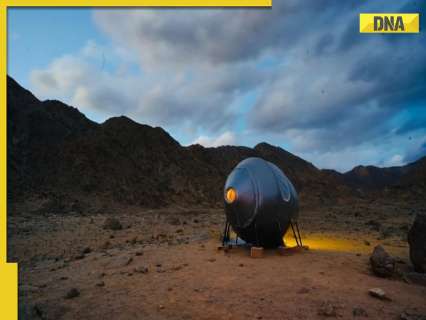
The Indian Space Research Organisation (ISRO) is getting ready to carry out an exciting 21-day simulation of Mars and Moon missions in Ladakh’s challenging terrain. This programme will try to imitate conditions astronauts may come across in those far away space locations and help gather important data and test new technologies. The main aim or the analog mission in Ladakh is to explore new possibilities by mimicking the harsh conditions that are found on Mars and the Moon.
Ladakh’s typical landscape, tough climate and remote location make it the perfect location to imitate the challenges that astronauts are likely face on the distant space locations. The programme is a combined effort between the University of Ladakh, IIT-Bombay, Aaka Space Studio, an architecture firm and ISRO, its Human Spaceflight Centre. It will highlight an important leap forward in India’s advancement in human space exploration.
The programme will help the Gaganyaan mission and other future projects, such as the Bharatiya Space Station and help further India gather important information to prepare for forthcoming space missions. Why Ladakh? A Smart Choice for Analog Research Dry climate, high elevation and barren landscapes in Ladakh are conditions that are very similar to those on Mars and the Moon, which makes it the perfect location for space simulation programmes. Goals of the Ladakh Mission 1.
Assessment of Human Health in Isolation: The programme will examine how human health and performance get affected in isolation and under harsh atmospheres. It will also provide important information about the mental and physical challenges that astronauts are likely to face while on prolonged space missions. 2.
Innovative Habitat Designs: Aaka Space Studio Pvt. Ltd will experiment new habitat ideas to see the best use of resources, sustainability and adaptability in extreme space environments. They will also test a foldable fabric structure to show its longevity and performance under harsh conditions and provide vital information on forthcoming Moon and Mars missions.
3. Biometric Data Monitoring: The simulation area will record biometric data, such as oxygen levels, body temperature, heart rate and other vital signs on a daily basis, to study the human body’s response to isolation and harsh environments. 4.
Simulating Space Terrain: Ladakh’s rough landscape provides a great setting for practising spacewalks (EVA) and low-gravity tasks essential for future Moon and Mars missions. 5. Circadian Lighting Research: To help regulate an astronaut’s sleep-wake cycle, better well-being during long isolation periods, the location will also have a special lighting system.
This important information will help understand how lighting can help human health in space. 6. Life Support Systems: The programme will even assess the necessary life support systems that are required to keep astronauts alive in space—including recycling water, checking air quality and ensuring energy efficiency within the habitat.
Aaka’s Innovative Space Ideas Founder Aastha Kacha, a renowned space architect, two-time TEDx speaker, technologist and philanthropist, shared with the media the vision behind Aaka Space Studio. Aaka mainly focuses on creating advanced interactive, human-centered living spaces, wants to mix technical expertise to design habitats for space missions on the Moon, Mars and other planets. It mainly wants to design, test and build livable structures that can be carried easily using Origami-inspired designs in space architecture.
The Rising Impact of Aaka Space Studio Pvt Ltd Aaka Space Studio Pvt. Ltd, registered with the Indian National Space Promotion and Authorization Center (IN-SPACe), has garnered importance as India’s top space architecture organisation. The studio basically designs human habitats, highlighting the well-being and sustainability in space.
Moreover, it helps ISRO train and mentor aspiring space architects and engineers in India. Past Accomplishments The Ladakh mission builds on Aaka Space Studio Pvt. Ltd’s successful Lunar Analog Expedition, held earlier in 2023 in the White Rann of Kutch.
This previous mission tested human endurance, technology and habitat designs in a simulated lunar environment, laying the groundwork for the forthcoming Mars and Moon analog in Ladakh. (The author of this article is a Defence, Aerospace & Political Analyst based in Bengaluru. He is also Director of ADD Engineering Components, India, Pvt.
Ltd, a subsidiary of ADD Engineering GmbH, Germany. You can reach him at: [email protected]) (Disclaimer: The views expressed above are the author's own and do not reflect those of DNA).














